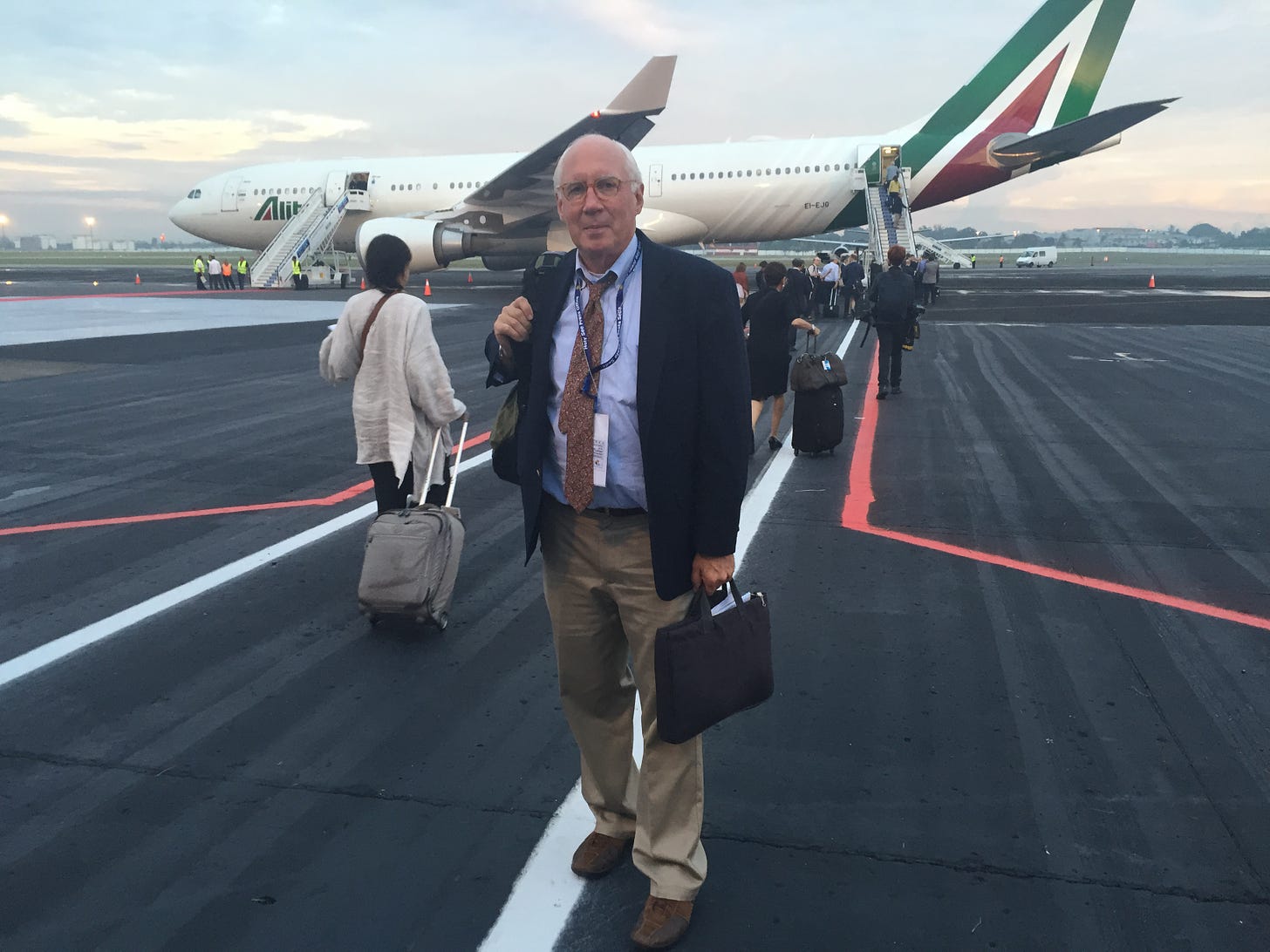“If It Can Save Lives, the World Needs to Know”
David O’Reilly, award-winning former Philadelphia Inquirer reporter, says ivermectin deserves more research and balanced media coverage.

Editor’s note: David O’Reilly was an award-winning reporter for The Philadelphia Inquirer who covered the religion beat, among many other things, and twice won the Templeton Prize as the best religion writer in the United States. As the Inquirer’s religion writer for 22 years he traveled the globe covering Pope Francis, interviewed the Dali Lama, and reported in Africa and South America on poverty and the complex changes confronting families and the Catholic Church worldwide. His reporting on abusive priests led to a new law in Pennsylvania to protect victims. Today we publish his first story for RESCUE, which you can read here: “A Lifeline from Buenos Aires,” about Dr. Hector Carvallo of Argentina, who discovered ivermectin’s power to prevent COVID-19. In the following author’s note, O’Reilly discusses how he came to write one of the first profiles by a mainstream journalist about Carvallo’s historic contribution. ~Michael Capuzzo
Author’s Note
During my thirty-five years at The Philadelphia Inquirer I don’t recall ever appending an author’s note to any of my articles. But since my profile of Dr. Hector Carvallo is my first submission to RESCUE, and because ivermectin is so controversial, I will here share some thoughts on this divisive topic and explain why I’m weighing in.
What motivates my writing about ivermectin is the enormous amount of misinformation and disinformation being heaped on this drug’s apparent life-saving potential in the fight against Covid. I want to be clear that I personally believe vaccines are the best resource available against this deadly virus, and I urge everyone to be vaccinated. That said, there is also an abundance of evidence that ivermectin: A) has virucidal properties; B) safely provides some protection against contracting Covid, and; C) appears to be efficacious in the treatment of Covid infection when used with other medicines.
In order to satisfy myself that the above statement is correct, and to prepare for my Carvallo article, I have read a good number of reports on ivermectin trials that have appeared in medical journals. I’ve also pored over several meta-analyses of those trials. (For readers unfamiliar with the term meta-analysis, these are surveys of dozens of papers on a particular topic in an attempt to determine the broad pattern of findings.)
Most medical papers are highly technical, of course, and as a non-medical layman I found myself struggling to grasp terms like “polycyclic lactones” and mystifying word-strings like the “interaction of sulfated polysaccharides with positively charged domains on the glycoprotein envelope involved in binding with protein glycans on the surface of the host cell.”
But here’s the deal: the great majority of these studies report that ivermectin does indeed provide some protection against Covid and some mitigation of symptoms for those who’ve contracted it. And yet many of the world’s leading health agencies continue to scoff and pour doubt on ivermectin’s safety and efficacy, mocking it as a “horse medicine,” or a “deworming medicine.” Or they say the study trials have been too small, or too informal, or “observational” when only double-blind randomized controlled trials with placebos can validate a drug’s value.
My profile of Dr. Carvallo concludes by noting the unfortunate scorn that’s been heaped on ivermectin as an anti-Covid drug, and it briefly cites a recent BuzzFeed story criticizing Carvallo’s methodology in his drug trials. Well, okay. I agree with the authors of that article that his trials had an informal, seat-of-the-pants quality to them. But they were conducted with virtually no funding, urgently compelled by the fact that the death toll from Covid was rising exponentially when there were no vaccines on the horizon.
So here’s something I’d like the authors of the BuzzFeed article, and anyone else critical of Dr. Carvallo’s trials, to chew on. Just weeks into the Covid pandemic researchers in Australia discovered that ivermectin killed 99.98 percent of the Covid-19 virus in laboratory tests.
Now please ask yourself this: what was an appropriate response to that news? Ignore it? Or test it?
Carvallo and his colleague, Dr. Roberto Hirsch, urged the American Medical Association to test it, and quickly. It was only when the AMA showed no interest in their plea that they hastily confected their own unfunded trials, starting at their own hospital. The results, as noted in my RESCUE article, were overwhelmingly positive, and the doctors announced them to the medical community. What else should they have done? All evidence suggests that Carvallo and Hirsch were motivated by compassion, with no self-interest. They did not claim to have settled the ivermectin question. They believed their trials should precipitate further study—and fast.
So when I read complaints that certain Covid trials of ivermectin are methodologically inadequate or imperfect—and therefore inconclusive and worthy of disdain—my response is: Stop it. Let’s fund whatever massive, robust, randomized controlled trials it takes to make a conclusive decision about ivermectin’s role in the battle against Covid.
As noted above, I believe vaccines are safe and effective and the ideal prophylaxis against Covid where available. But in parts of the world where vaccines are not available, the preponderance of research suggests to me that ivermectin is the safe and efficacious alternative. To tell doctors and hospitals not to prescribe it is like telling people in a burning building not to use the fire escape. “Please wait for the elevators,” they say. Only the curtains are on fire, the rooms are filling with smoke, folks can’t breathe, and the elevator doors aren’t opening.
If the first principle of medicine is to “do no harm,” it’s incumbent upon the medical community to respect the sincere drug trials of ivermectin that have appeared thus far, and to conduct robust trials of ivermectin. If it can save lives, the world needs to know.




Thank you for stepping up David on this misunderstood topic. I need to say that the large scale trials that are in the works are likely designed to fail unfortunately. Can't say I'm surprised however. They are accepting volunteers within 14 days of symptoms for their early treatment trial. The progression of the virus is such that even 1 week from initial symptoms let alone 2 weeks is NOT considered early treatment. They are also treating for only 3 days. IF they actually provided early treatment, with 72 hours of symptoms for example, that might be adequate but further along in the progression of this virus, it will not be effective, most likely. Also, I have not been able to find the dosages that they're using. Most likely insufficient for the Delta variant. One only needs to see who is funding this to know the outcomes. The regulatory capture of our academic/research institutions and our public health agencies is complete. No need to believe me on this when we have the conclusions from the editors in chief of peer reviewed journals.
As you likely know, two of the most prestigious journals of medicine are The Lancet and The New England Journal of Medicine (NEJM).
Dr. Marcia Angell, Harvard physician and editor in chief of the NEJM for 2 decades said this in 2009-
“It is simply no longer possible to believe much of the clinical research that is published, or to rely on the judgment of trusted physicians or authoritative medical guidelines. I take no pleasure in this conclusion, which I reached slowly and reluctantly over my two decades as an editor.”
Dr. Relman, another former editor in chief of the NEJM said this in 2002 - “The medical profession is being bought by the pharmaceutical industry, not only in terms of the practice of medicine, but also in terms of teaching and research. The academic institutions of this country are allowing themselves to be the paid agents of the pharmaceutical industry. I think it’s disgraceful.”
Richard Horton, editor in chief of The Lancet said this in 2015 “The case against science is straightforward: much of the scientific literature, perhaps half, may simply be untrue.”
This is literally an unbelievable situation. The profound medical censorship and intentional misinformation regarding ivermectin is horrifying to me as it should be to all of you.
Michelle Rabin, Ph.D.
The key question is chilling: "what was the appropriate response to that news?" It will be haunting the lives of the loved ones left behind, and those left severely disabled from their untreated infections. Dr. Kory's passionate testimony before the US Senate, begging for the NIH to re-examine the emerging evidence about ivermectin took place almost 10 months ago, in December, 2020 . We've now had 10 months of this horrible disease raging unchecked, and UNTREATED through the population. I disagree with the author's conclusion, however. We do not need more trials. We need to remove the inhumane, cruel, and yes I'd say, EVIL, barriers to widespread treatment that the industry-captured regulatory agencies and medical associations have placed in the path of physicians treating their patients with an effective, cheap, and widely available anti-viral (as all the new studies and real world experience shows to be true) medication: ivermectin. They are so obviously stalling for time in order to bring their own (undoubtedly inferior, and absolutely massively expensive) anti-viral to market before ivermectin use can establish a stronghold on the treatment market.
Tell the FDA, CDC, WHO, NIH: NO MORE vilifying treatment! Tell the AMA and any agency or association dictating non-treatment of patients: NO MORE interfering with the doctor/patient relationship! We need NO MORE trials! Roll out ivermectin and the other FLCCC covid treatment protocols widely, RIGHT NOW! The absolute worst that could happen is that nothing gets better, and the best (and even likely!) is that the pandemic and the suffering can be ended quickly.